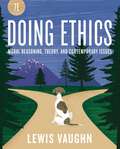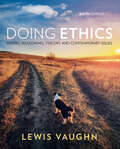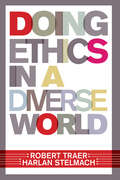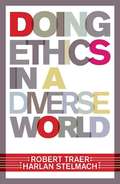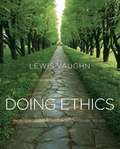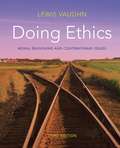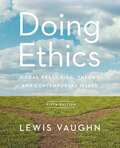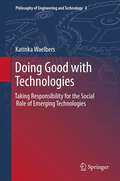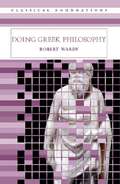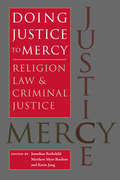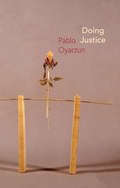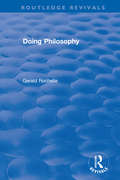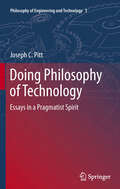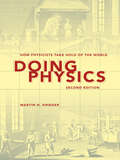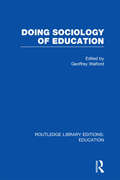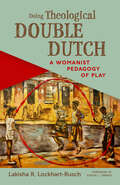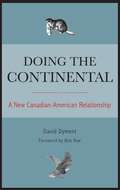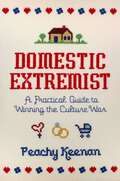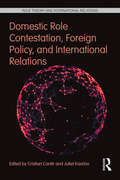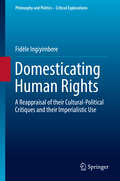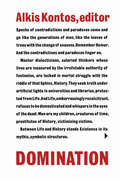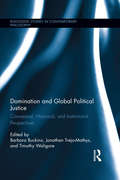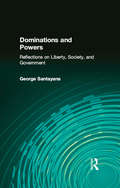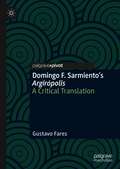- Table View
- List View
Doing Ethics (Seventh Edition): Moral Reasoning And Contemporary Moral Issues
by Lewis VaughnDiscover the #1 introductory ethics textbook Doing Ethics by Lewis Vaughn is a Swiss Army knife for courses in introductory ethics. Instructors love that it combines the benefits of a moral theory primer, a handbook on moral reasoning, and an applied ethics anthology in one inexpensive volume. Throughout the text, clear writing and remarkably effective pedagogy reinforce core concepts and invite students to think critically about the material. InQuizitive—Norton’s easy-to-use learning tool—sharpens students’ understanding of moral reasoning fundamentals and prepares them to engage with real-world issues. New InQuizitive questions focus on the Seventh Edition’s updated coverage of the moral issues facing today’s students.
Doing Ethics (Sixth Edition): Moral Reasoning, Theory, And Contemporary Issues
by Lewis VaughnTeaching students how to actively apply moral reasoning Doing Ethics is the best-selling book for courses with an applied emphasis. It teaches moral decision making as an active process, giving students the theoretical and logical tools required to do ethics. The Sixth Edition offers expanded coverage of relevant issues, including race and racism, health care, and tolerance and civility online and in public spaces. New activities in InQuizitive—Norton's award-winning adaptive learning tool—have been expanded to include material on contemporary topics, enabling students to apply moral reasoning to the issues they care about, both in the course and beyond.
Doing Ethics In A Diverse World
by Robert TraerNothing is more difficult today than deciding what to do about abortion, gay marriage, economic injustice, war, torture, global warming, euthanasia, capital punishment, and a host of other controversies, particularly in a world in which people of varying religious, cultural, and ethnic backgrounds commonly live side by side. Can we draw on the wisdom of the past to address these contemporary ethical dilemmas? Can we see more clearly how we should consider what is right and wrong, and good and bad, and then work through these divisive problems toward decisions that make sense to us? While challenging moral relativism, Doing Ethics in a Diverse World uses a pluralist approach that draws on religious as well as secular positions and on Eastern as well as Western traditions. The book's approach reasons by analogy from the rule of law, including international human rights law, as a means to constructing ethical presumptions about duty, character, relationships, and rights. These presumptions are weighed against the predicted consequences of acting on them, which either confirm the presumptions or support alternative actions.
Doing Ethics in a Diverse World
by Robert Traer Harlan StelmachNothing is more difficult today than deciding what to do about abortion, gay marriage, economic injustice, war, torture, global warming, euthanasia, capital punishment, and a host of other controversies, particularly in a world in which people of varying religious, cultural, and ethnic backgrounds commonly live side by side. Can we draw on the wisdom of the past to address these contemporary ethical dilemmas? Can we see more clearly how we should consider what is right and wrong, and good and bad, and then work through these divisive problems toward decisions that make sense to us?While challenging moral relativism, Doing Ethics in a Diverse World uses a pluralist approach that draws on religious as well as secular positions and on Eastern as well as Western traditions. The book's approach reasons by analogy from the rule of law, including international human rights law, as a means to constructing ethical presumptions about duty, character, relationships, and rights. These presumptions are weighed against the predicted consequences of acting on them, which either confirm the presumptions or support alternative actions. Employing a "Worksheet for Doing Ethics" as a guiding framework, this approach is then applied to issues of public morality, health care, economic justice, sex, the war on terrorism, and living ecologically.
Doing Ethics: Moral Reasoning and Contemporary Issues (2nd edition)
by Lewis VaughnDoing Ethics is really three books in one: a clear and comprehensible introduction to ethical theory, a practical guide for applying critical thinking skills to contemporary moral issues, and an anthology of readings in applied ethics. The Second Edition includes 38 new readings and 2 new topics adding value for students in terms of usage.
Doing Ethics: Moral Reasoning and Contemporary Issues (Third Edition)
by Lewis VaughnThis book helps students see why ethics matters to society and to themselves, understand core concepts ,be familiar with the background of contemporary moral problems; and know how to apply critical reasoning to those problems.
Doing Ethics: Moral Reasoning, and Contemporary Issues
by Lewis VaughnThis is the best-selling book for courses with an applied emphasis. It teaches moral decision making as an active process, giving students the theoretical and logical tools required to do ethics. The Fifth Edition offers expanded coverage of topics that students find relevant, including free speech on campus, hook-up culture, sexual consent, racism, and discrimination. A NEW InQuizitive adaptive learning tool features game-like activities that build mastery of core concepts and theories.
Doing Good with Technologies:
by Katinka Waelbers20th century technologies like cars, the Internet, and the contraceptive pill have altered our actions, changed our perceptions and influenced our moral ideas, for better and worse. Upcoming technologies are bound to fulfill their own unique social roles. How can we advance this social role so that it will support the good live and limit undesired changes? This book explores whether we can take a forward looking responsibility to optimize the social roles of technologies. In doing so, the book discusses three issues: first, it aims to understand the social role of technologies; second, it explores what it means to accept responsibility for this social role, and; third, it searches for some forward looking tools that help us to see how new technologies may influence human behavior. In a rather unique approach, this book combines the influential sociological research of Bruno Latour on the social impacts of technologies with the contemporary Aristotelianism of Alasdair MacIntyre.
Doing Greek Philosophy (Classical Foundations)
by Robert WardyThis lively and original guidebook offers an invitation to the study of Greek philosophy and signposts to lead the student deeper. The reader is drawn in to the questions the philosophers posed. Doing Greek Philosophy conveys a vital sense of the dynamism and continuity in the Greek philosophical tradition, and shows how interaction between the philosophers creates and sustains that tradition. It concentrates on a set of interrelated concepts and problems – contradiction, relativism, refutation and consistency – which appear in the tradition, and show how philosophers dealt with them. The author considers not just what the philosophers were doing, but also what they thought they were doing. The goal is not simply to inform readers about Greek philosophy, but also to equip them with an intellectual toolkit, and to encourage them to use it. The reader will come away from this book with a set of good questions and the means to probe them further. Accessibly written, the book will appeal to philosophers at every level, and its concision will make it the ideal starting point for the beginner in philosophy.
Doing Justice to Mercy: Religion, Law, and Criminal Justice (Studies in Religion and Culture)
by Jonathan Rothchild Kevin Jung Matthew Myer BoultonIt is often assumed that the law and religion address different spheres of human life. Religion and ethics articulate complex systems of moral reasoning that concern norms, deliberation of ends, cultivation of disposition, and transformation of moral agency. Law, in contrast, seeks to govern human conduct through procedural justice, rights, and public good. Doing Justice to Mercy challenges this assumption by presenting the reader with an urgent conversation between the law and religion that yields a constructive approach, both theoretically and practically, to the complex role of mercy in our legal process. Authored by legal practitioners, activists, and theorists in addition to theologians and ethicists, the essays collected here are informed by timeless principles, and yet they could not be timelier. The trend in sentencing moves toward an increased severity, and the number of incarcerated people in the United States is at an all-time high. In the half-decade since 9/11, moreover, homeland security has established itself as a permanent fixture in our lives. In this atmosphere, the current volume seeks initially to clarify how justice and mercy intertwine in relation to a number of issues, such as rehabilitation, the death penalty, domestic violence, and war crimes. Exploring the legal, philosophical, and theological grounds for mercy in our courts, the discussion then moves to the practical ways in which mercy may be implemented.Contributors:Marc Mauer, The Sentencing Project * Lois Gehr Livezey, McCormick Theological Seminary * Ernie Lewis, Public Advocate, Commonwealth of Kentucky * Jonathan Rothchild, Loyola Marymount University * Albert W. Alschuler, Northwestern University School of Law * David Scheffer, Northwestern University School of Law * David Little, Harvard Divinity School * Matthew Myer Boulton, Andover Newton Theological School * Mark Lewis Taylor, Princeton Theological Seminary * Sarah Coakley, Cambridge University * William Schweiker, University of Chicago Divinity School * Kevin Jung, College of William and Mary * Peter J. Paris, Princeton Theological Seminary * W. Clark Gilpin, University of Chicago Divinity School * William C. Placher, Wabash College
Doing Justice: Three Essays on Walter Benjamin (Critical South)
by Pablo OyarzunPablo Oyarzun is one of the foremost Benjamin scholars in Latin America. His writings have shaped the reception of Benjamin’s work in Latin America and have been central to the effort to identify the tasks and responsibilities of the kind of critical theory that would interrupt social violence. In this book Oyarzun examines some of the key concepts in Benjamin’s work – including his concepts of translation, experience, history and storytelling – and relates them to his own systematic reflection on the nature and implications of ‘doing justice’. What is meant by the words ‘justice was done’? The passive voice is important here. On the one hand, justice does nothing: it is not an agent, it can only prevail or fail, and if it fails, it does so without limit. On the other hand, the passive voice alludes to the agents of an action while covering them up; the allusion is the masking of the identity and traces of the person who accomplishes the action. And this cover-up can be dangerous: it can cover-up the executioners, who are subjects that everyone can confirm anonymously, without their being recognized and without their wanting to be recognized. Justice, argues Oyarzun, can only be done in the active effort to do justice – or, as Benjamin would say, in the striving to turn the world into the highest good. This book by one of Chile’s most distinguished philosophers will be of value to anyone interested in Benjamin’s work and in the development of critical theory in Latin America.
Doing Philosophy (Routledge Revivals)
by Gerald RochelleFirst published in 2012, Doing Philosophy presents the basics of how ‘to do’ philosophy — what philosophy is, how we can think, the nature of logic, some special terms — in a straightforward and easy to understand style. Then, using questions and exercises as well as everyday examples, the author takes the reader on a wide-ranging tour of key philosophical topics which, as well as the ‘standard fare’ of logic, epistemology, mind, God etc., also includes ethical, social, scientific, cultural and human issues such as time, cosmology, war, animal rights, euthanasia, abortion, genetics, evolution, and the meaning of life. The author’s emphasis throughout is that philosophy is accessible to anyone keen enough to try and do it and that, as a subject, philosophy is practical, fascinating and exciting. By encouraging independent critical thinking and being succinct yet informative, the book involves the reader with the history, the breadth of subject matter, the skills of philosophising and the benefits that philosophy can offer to the enquiring individual. The book accesses major philosophical topics briefly, breaking them down into convenient points, with challenging questions throughout and exercise questions at the end of each chapter, whilst introducing major thinkers and their ideas. There is an extensive further reading list to help those who wish to take this absorbing subject further.
Doing Philosophy of Technology
by Joseph C. PittAs science becomes more deeply embedded in a complex technological infrastructure, has this changed the relationship between the sciences and the various technologies that support them? As our technologies help shrink our world, can we restrict our ethical concerns or must we find a way to face the fact that we are now one world? What do new forms of architecture say about whom we are? Is the design process the new epistemological paradigm? The answers to all of these is "yes" according to Joseph C. Pitt (VirginaTech). Doing Philosophy of Technology presents an updated and integrated overview of the most important thinking from this prominent philosopher of technology. Throughout his career Joseph C. Pitt has defended the view that to say anything meaningful about the value of a technology one must know something about that technology and how it functions in the world. This starting point leads naturally to a pragmatist philosophical stance, since it is the real world consequences of introducing a technology that must be the basis for any further normative judgements. In the book we find an extended set of arguments that challenge the idea that there are eternal philosophical issues that transcend the impacts that technologies make on human beings and their world. Rather, it is claimed that as our technologies transform our world they transform us and the kinds of questions we find important to answer.
Doing Physics, Second Edition: How Physicists Take Hold Of The World
by Martin H. KriegerDoing Physics makes concepts of physics easier to grasp by relating them to everyday knowledge. Addressing some of the models and metaphors that physicists use to explain the physical world, Martin H. Krieger describes the conceptual world of physics by means of analogies to economics, anthropology, theater, carpentry, mechanisms such as clockworks, and machine tool design. The interaction of elementary particles or chemical species, for example, can be related to the theory of kinship--who can marry whom is like what can interact with what. Likewise, the description of physical situations in terms of interdependent particles and fields is analogous to the design of a factory with its division of labor among specialists. For the new edition, Krieger has revised the text and added a chapter on the role of mathematics and formal models in physics. Doing Physics will be of special interest to economists, political theorists, anthropologists, and sociologists as well as philosophers of science.
Doing Sociology of Education (Routledge Library Editions: Education)
by Geoffrey WalfordThis collection of specially commissioned articles exposes the practical and personal influences on the process of doing sociology of education. All of the authors have been involved in conducting well know major research projects, and discuss here the pitfalls and problems, conflicts and compromises that went into doing their particular research. A particular feature of the book is that a wide variety of types of research in the sociology of education is covered. The range is from small-scale ethnographic case studies to large-scale postal questionnaire sample surveys and includes studies based on interviews, observation and questionnaires. There are examples of longitudinal work in case studies and in surveys. The collection also includes discussions of action research, the development and influence of theory, and the relationship between research and policy.
Doing Theological Double Dutch: A Womanist Pedagogy of Play
by Lakisha R. Lockhart-RuschEmbodied womanist play brings us closer to ourselves, to others, and to the divine. In this remarkably innovative book, Lakisha R. Lockhart-Rusch offers a fresh vision for theological education rooted in the embodied insights of Black women. Acknowledging the historical reality that play has often been a privilege reserved for those in power, Lockhart-Rusch shows how play has nonetheless functioned as a hidden space of agency, healing, and resistance for Black women. Using the game of Double Dutch as an extended metaphor, she demonstrates how a womanist pedagogy of play offers a transformative encounter with the love of self and of God for students from all backgrounds. Coupling theory with practical tools, this book equips theological educators to teach across difference for the liberation of all.
Doing the Continental: A New Canadian-American Relationship
by Bob Rae David DymentAdvance Praise for Doing the Continental: "Everyone has opinions about the state of Canada-U.S. relations, but few have the knowledge to provide informed judgments. Professor Dyment happily falls into the latter category. While some of the prescriptions are controversial, this concise book has been carefully thought out and provides excellent grist for the Canadian policy mill. Doing the Continental is a must read for those interested in Canadian-American relations." Michael Kergin, Canada’s Ambassador to the United States, 2000 to 2005. When President Barack Obama sat at his desk for the first time in the Oval Office in January 2009, one of the farthest things from his mind was Canada. On Capitol Hill the whirling pursuit of interests was intense. In Ottawa, Canada’s senior officials were too preoccupied to appreciate that the nations neighbours to the south weren’t paying attention to the affairs and concerns of the Great White North. Canada’s relations with the United States are broad and deep, and with Obama in his second term in office, the two countries have entered what could be considered a new era of hope and renewal. From water and energy policy to defence, environmental strategy, and Arctic sovereignty, David Dyment provides an astute, pithy analysis of the past, present, and future continental dance between two countries that have much in common, yet often step on each others feet.
Domestic Extremist: A Practical Guide to Winning the Culture War
by Peachy KeenanSpot-on, often satirical, always insightful, contributing editor of The American Mind and mother of a brood, Peachy Keenan argues that the only way we can save our families, ourselves, and the world—even California!—is by embracing our inner domestic extremists, and sweeping failed notions of third wave feminism and identity politics nonsense into the garbage can of history.In This House We Believe Parents Are the Bosses of Their Kids Babies Are Good, More Babies Are Better Two Sexes Are Plenty Your Career Is Overrated Feminism Is How the Unpopular and Undateable Cope with Life Mainstream American Culture Destroys Families We Are Going to WinWe&’re in a culture war, and Peachy Keenan is not taking prisoners. This raucous new book is her rallying cry for normal people stuck in the foxholes and appalled by the status quo.Mothers and fathers, regular American families, men and women, can win this battle together. But a lot of ground has been lost. For decades, we stood around and watched as feminists and progressives steamrolled through our institutions— those formerly robust, now comically inept, pillars of civilization like our government, our schools, and, crucially, our families. With matchless insight and devastating humor, Peachy Keenan makes the case for domestic extremism—turning away from the diseased offerings of the elites, the media, Hollywood, your child&’s school, and Big Tech, and embracing a more human way of life. The life-changing magic of domestic extremism will spark joy and help you build a legacy that will enrich the lives of your (many) descendants.
Domestic Role Contestation, Foreign Policy, and International Relations (Role Theory and International Relations)
by Juliet Kaarbo Cristian CantirDespite the increase in the number of studies in international relations using concepts from a role theory perspective, scholarship continues to assume that a state’s own expectations of what role it should play on the world stage is shared among domestic political actors. Cristian Cantir and Juliet Kaarbo have gathered a leading team of internationally distinguished international relations scholars to draw on decades of research in foreign policy analysis to explore points of internal contestation of national role conceptions (NRCs) and the effects and outcomes of contestation between domestic political actors. Nine detailed comparative case studies have been selected for the purpose of theoretical exploration, with an eye to illustrating the relevance of role contestation in a diversity of settings, including variation in period, geographic area, unit of analysis, and aspects of the domestic political process. This edited book includes a number of pioneering insights into how the domestic political process can have a crucial effect on how a country behaves at the global level.
Domesticating Human Rights
by Fidèle IngiyimbereThis book develops a philosophical conception of human rights that responds satisfactorily to the challenges raised by cultural and political critics of human rights, who contend that the contemporary human rights movement is promoting an imperialist ideology, and that the humanitarian intervention for protecting human rights is a neo-colonialism. These claims affect the normativity and effectiveness of human rights; that is why they have to be taken seriously. At the same time, the same philosophical account dismisses the imperialist crusaders who support the imperialistic use of human rights by the West to advance liberal culture. Thus, after elaborating and exposing these criticisms, the book confronts them to the human rights theories of John Rawls and Jürgen Habermas, in order to see whether they can be addressed. Unfortunately, they are not. Therefore, having shown that these two philosophical accounts of human rights do not respond convincingly to those the postcolonial challenges, the book provides an alternative conception that draws the understanding of human rights from local practices. It is a multilayer conception which is not centered on state, but rather integrates it in a larger web of actors involved in shaping the practice and meaning of human rights. Confronted to the challenges, this new conception offers a promising way for addressing them satisfactorily, and it even sheds new light to the classical questions of universality of human rights, as well as the tension between universalism and relativism.
Domination
by Alkis KontosOne is usually conscious of tyranny and oppression; domination is more subtle. It is an abandonment of our freedom, our will, and our love of justice, and yet socially, psychologically, and ontologically domination in some degree seems inevitable. There is now in the western world an uneasy sense that more domination is going on than necessary, and this work tries to outline the theoretic modalities of this human predicament. The twelve essays in Domination examine such questions as: Does the ego of the infant require for its development some experiences of dominance? Is it men or the system that causes the domination of women? How has capitalism with its property laws entailed limits on national and personal freedom? What do existentialism and critical theory have to tell us about violence and reason, or about magic and science, as modes of life that constrain everyone? What is racialism? And, if the world is beyond the powers of reason, what does modern man now make his public and private raison d'être? Those who are looking for amelioration of the quality and quantity of human freedom will find this book helpful in defining and cracking the chains. The contributors, in order of their appearance of their essays, are O. Weininger, Elizabeth Brady, R.T. Naylor, R.O. Matthews, C.B. Macpherson, Monika Langer, Keith McCallum, Ato Sekyi-Out, Christian Lenhardt, Ben Agger, David Cook, and Alkis Kontos.
Domination and Global Political Justice: Conceptual, Historical and Institutional Perspectives (Routledge Studies in Contemporary Philosophy #66)
by Jonathan Trejo-Mathys Barbara Buckinx Timothy WaligoreDomination consists in subjection to the will of others and manifests itself both as a personal relation and a structural phenomenon serving as the context for relations of power. Domination has again become a central political concern through the revival of the republican tradition of political thought (not to be confused with the US political party). However, normative debates about domination have mostly remained limited to the context of domestic politics. Also, the republican debate has not taken into account alternative ways of conceptualizing domination. Critical theorists, liberals, feminists, critical race theorists, and postcolonial writers have discussed domination in different ways, focusing on such problems as imperialism, racism, and the subjection of indigenous peoples. This volume extends debates about domination to the global level and considers how other streams in political theory and nearby disciplines enrich, expand upon, and critique the republican tradition’s contributions to the debate. This volume brings together, for the first time, mostly original pieces on domination and global political justice by some of this generation’s most prominent scholars, including Philip Pettit, James Bohman, Rainer Forst, Amy Allen, John McCormick, Thomas McCarthy, Charles Mills, Duncan Ivison, John Maynor, Terry Macdonald, Stefan Gosepath, and Hauke Brunkhorst.
Dominations and Powers: Reflections on Liberty, Society, and Government
by George Santayana"In what must be ranked as a foremost classic of twentieth-century political philosophy, George Santayana, in the preface to his last major work prior to his death, makes plain the limits as well as the aims of Dominations and Powers: ""All that it professes to contain is glimpses of tragedy and comedy played unawares by governments; and a continual intuitive reduction of political maxims and institutions to the intimate spiritual fruits that they are capable of bearing.""This astonishing volume shows how the potential beauty latent in all sorts of worldly artifacts and events are rooted in differing forms of power and dominion. The work is divided into three major parts: the generative order of society, which covers growth in the jungle, economic arts, and the liberal arts; the militant order of society, which examines factions and enterprise; and the rational order of society, which contains one of the most sustained critiques of democratic systems and liberal ideologies extant.Written at a midpoint in the century, but at the close of his career, Santayana's volume offers an ominous account of the weakness of the West and its similarities in substance, if not always in form, with totalitarian systems of the East. Few analyses of concepts, such as government by the people, the price of peace and the suppression of warfare, the nature of elites and limits of egalitarianism, and the nature of authority in free societies, are more comprehensive or compelling. This is a carefully rendered statement on tasks of leadership for free societies that take on added meaning after the fall of communism.The author of a definitive biography of Santayana, John McCormick provides the sort of deep background that makes possible an assessment of Dominations and Powers. He permits us to better appreciate the place of this work at the start no less than conclusion of Santayana's long career. For the author of The Life of Reason himself ad"
Domingo F. Sarmiento’s Argirópolis: A Critical Translation
by Gustavo FaresThis book provides the first English translation of Argirópolis (1850) by the Argentine Domingo F. Sarmiento, one of the most important political and cultural figures of nineteenth-century Latin America. Argirópolis proposes the union of Argentina, Paraguay, and Uruguay into the United States of South America or the United States of the Río de la Plata, with a capital on Martín García island. It anticipates some aspects of the continent’s future, such as the formation of Mercosur (the Southern Common Market) in 1991. Argirópolis explores politics, modernity, and nation formation, making Sarmiento’s treatise one of Argentina and Latin America’s most relevant programmatic texts. Presented alongside a critical introduction that situates the essay in its historical and political contexts, this translation allows English-speaking readers to explore nineteenth-century Latin American perspectives on concepts such as the nation-state, sovereignty, progress, space, and modernity.
